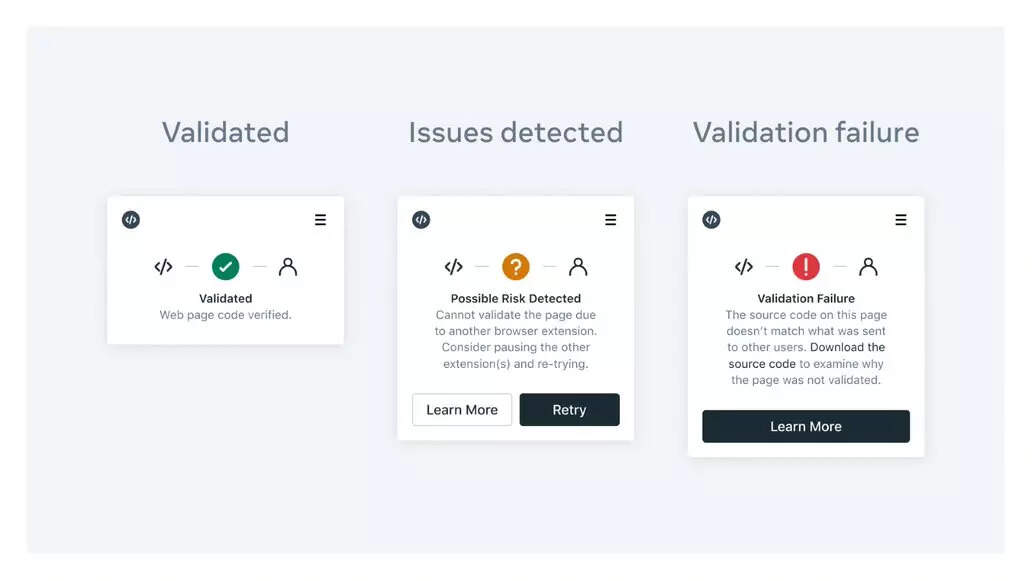WhatsApp A new layer of security has been announced for WhatsApp Web. called code verification, it’s a web browser Extension that provides real-time, third-party verification for users to check running code whatsapp web Has not been tampered with. WhatsApp says that in simple words, verify code There is a traffic light to protect their WhatsApp web account.
WhatsApp has launched Code Verification in partnership with cloudflare, According to the company, “Code Verify is also being open sourced so that other messaging services can enable people to verify that the code they are being served on the web is the same that everyone else is using. ”
How Code Verify works on WhatsApp
Code Verify will work on Google Chrome, Firefox and Microsoft Edge web browsers. Once users have installed the Code Verification extension, it will be automatically pinned to their Firefox or Edge browser. However, Google Chrome users will have to pin it themselves. When a user accesses WhatsApp Web, the code verification extension will automatically compare the code that the browser receives with WhatsApp Web. It will create a hash (which is like a fingerprint of the code) and then match it with the hash or fingerprint of the code shared by WhatsApp Web with CloudFlare.

* If the code matches and is valid, the Verify Code icon on the user’s browser will turn green.
* If the code verification icon on the browser turns orange when WhatsApp Web loads, it means that another browser extension is interfering with WhatsApp Web’s ability to verify, or it means that the request has timed out and the page just needs to be refreshed
* If the code verification icon on the browser turns red when WhatsApp Web loads, it would indicate that there is a potential security issue with the WhatsApp code. The user can then take action, such as blocking other extensions, switching to the mobile version of WhatsApp, or downloading the source code and giving it to a third party organization for analysis.
The Facebook-owned company claims, “The idea itself – comparing hashes to detect tampered or corrupted files – is not new, but automating it, deploying it on a large scale and ensuring that it is accessible to WhatsApp users.” is for “just works”.
WhatsApp has launched Code Verification in partnership with cloudflare, According to the company, “Code Verify is also being open sourced so that other messaging services can enable people to verify that the code they are being served on the web is the same that everyone else is using. ”
How Code Verify works on WhatsApp
Code Verify will work on Google Chrome, Firefox and Microsoft Edge web browsers. Once users have installed the Code Verification extension, it will be automatically pinned to their Firefox or Edge browser. However, Google Chrome users will have to pin it themselves. When a user accesses WhatsApp Web, the code verification extension will automatically compare the code that the browser receives with WhatsApp Web. It will create a hash (which is like a fingerprint of the code) and then match it with the hash or fingerprint of the code shared by WhatsApp Web with CloudFlare.

* If the code matches and is valid, the Verify Code icon on the user’s browser will turn green.
* If the code verification icon on the browser turns orange when WhatsApp Web loads, it means that another browser extension is interfering with WhatsApp Web’s ability to verify, or it means that the request has timed out and the page just needs to be refreshed
* If the code verification icon on the browser turns red when WhatsApp Web loads, it would indicate that there is a potential security issue with the WhatsApp code. The user can then take action, such as blocking other extensions, switching to the mobile version of WhatsApp, or downloading the source code and giving it to a third party organization for analysis.
The Facebook-owned company claims, “The idea itself – comparing hashes to detect tampered or corrupted files – is not new, but automating it, deploying it on a large scale and ensuring that it is accessible to WhatsApp users.” is for “just works”.